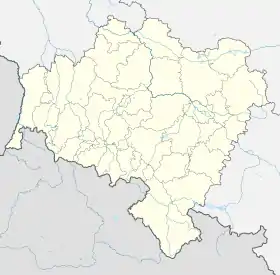Bystrzyca | |
|---|---|
Village | |
_ID_596507.jpg.webp) Our Lady of the Angels church in Bystrzyca | |
 Bystrzyca  Bystrzyca | |
| Coordinates: 50°57′42″N 17°23′34″E / 50.96167°N 17.39278°E | |
| Country | |
| Voivodeship | Lower Silesian |
| County | Oława |
| Gmina | Gmina Oława |
| Time zone | UTC+1 (CET) |
| • Summer (DST) | UTC+2 (CEST) |
| Vehicle registration | DOA |
Bystrzyca [bɨsˈtʂɨt͡sa] is a village in the administrative district of Gmina Oława, within Oława County, Lower Silesian Voivodeship, in south-western Poland.[1]
It lies approximately 8 kilometres (5 mi) north-east of Oława, and 31 kilometres (19 mi) south-east of the regional capital Wrocław.
History

The village dates back to the Middle Ages, and, according to linguist Heinrich Adamy, its name comes from the Polish word bystry. Within medieval Piast-ruled Poland, it was the location of a motte-and-bailey castle from the 10th-13th century, which is now an archaeological site.[2] In the 2000s, archaeologists found remains of medieval pagan and Christian burials at the site.[2] Later on, the village was part of Bohemia (Czechia), Prussia and Germany. During World War II, the Germans operated a forced labour camp for Jewish men and women in the village from 1941 to 1944.[3] After Germany's defeat in the war, in 1945, the village became again part of Poland.
In 1986, the Polish film Train to Hollywood was shot in Bystrzyca.[4]
Sports
The local football club is Burza Bystrzyca.[5] It competes in the lower leagues.
References
- ↑ "Central Statistical Office (GUS) - TERYT (National Register of Territorial Land Apportionment Journal)" (in Polish). 2008-06-01.
- 1 2 Radosław Solski. "Gródek stożkowaty". Zabytek.pl (in Polish). Retrieved 25 July 2021.
- ↑ "Zwangsarbeitslager für Juden Peisterwitz". Bundesarchiv.de (in German). Retrieved 25 July 2021.
- ↑ "Z Bystrzycy do Hollywood". olawa24.pl (in Polish). Retrieved 25 July 2021.
- ↑ "Burza Bystrzyca Oł. - strona klubu" (in Polish). Retrieved 25 July 2021.